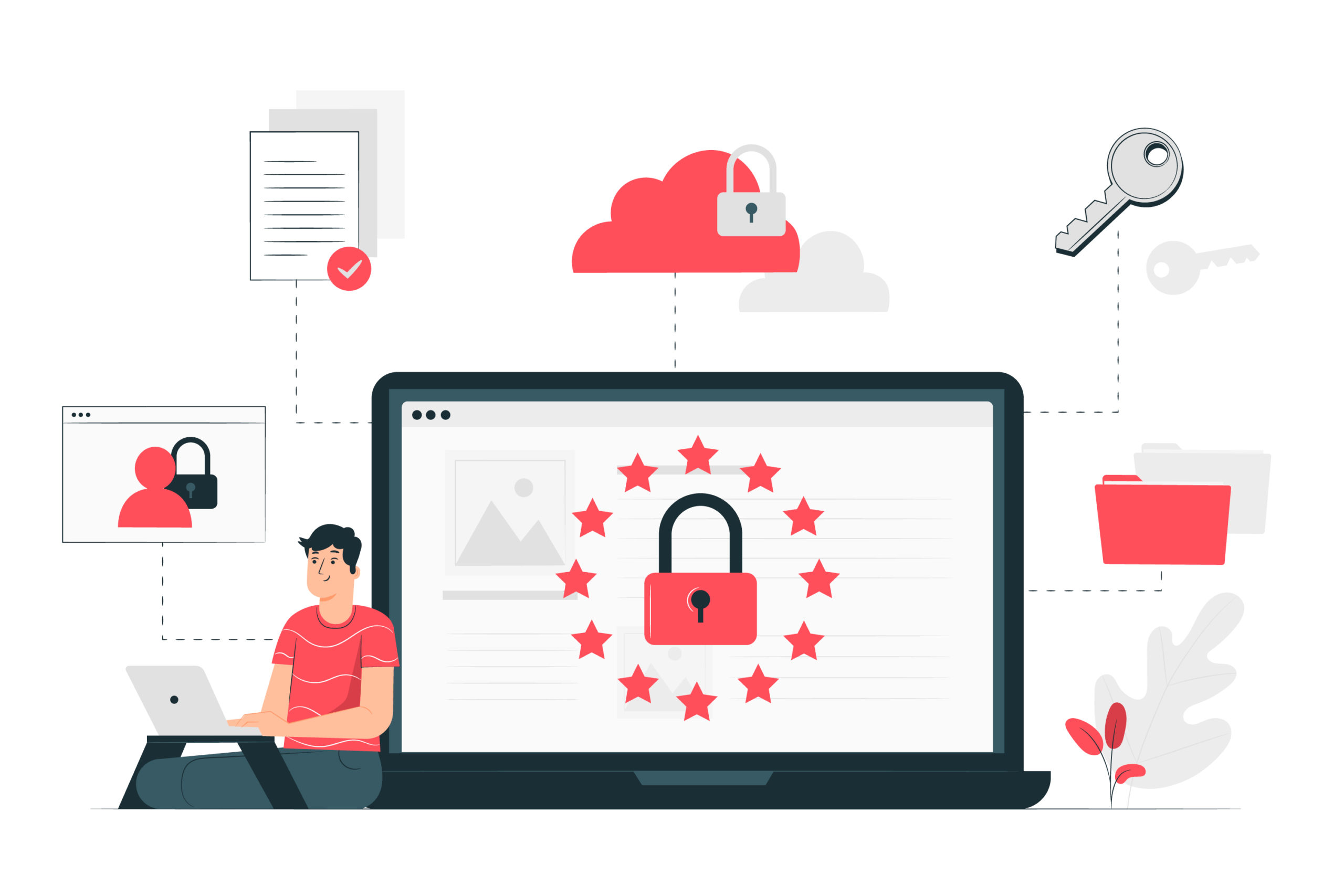5 Strategies for Effective Brand Reputation Monitoring

Brand Reputation Monitoring is crucial in today’s digital landscape where a single negative comment or review can spread like wildfire. Here are five strategies to effectively monitor your brand’s reputation
Table of Contents
Introduction
In today’s digital age, a company’s reputation can make or break its success, especially in the cybersecurity industry. Maintaining a positive brand reputation has become more challenging yet crucial with the increasing prevalence of online communication channels. This blog post will explore the significance of effective brand reputation management and provide practical strategies to help cyber security firms safeguard their reputation and credibility.
Understanding Brand Reputation Monitoring
Brand Reputation Monitoring encompasses the strategies and practices employed by businesses to shape and maintain their image in the eyes of customers, stakeholders, and the public. In the cyber security industry, where trust and credibility are paramount, managing brand reputation requires constant vigilance and strategic planning.
What is Brand Reputation Monitoring?
Brand Reputation Monitoring refers to the perception that consumers have of a particular brand. This perception may not necessarily align with the image that the company tries to convey but rather is formed based on how it is received by consumers. It is often the result of experiences, projections, sensations, and emotions, either from the consumers themselves or others.
Monitoring brand reputation involves various types of actions aimed at protecting a brand: reputation management itself, reputational risk management, and content creation strategy, aimed at developing and strengthening the brand in terms of image and positioning. According to a study by Forrester, brand reputation management accounts for over a third of the uses of monitoring and listening on social media.
Online reputation management (ORM) is what, exactly?

Online material must be published and optimized to dominate Google’s first page for branded search queries. A typical ORM plan can incorporate customer service techniques, social media marketing, public relations, and search engine optimization. Look for the experts who can provide you with the best solutions in media coverage and guarding your online reputation.
Yet, Search Engine Optimization (SEO) broadly refers to the practice of managing one’s online reputation. This is because managing what people discover when they search for your brand should be your top concern, regardless of whether you’re concentrating on brand health, aggressive damage management, or reputation recovery.
You can also read – Top 10 Best Phishing Tools for Advanced Protection (2024)
Why should you manage your brand’s reputation online?
There is no doubt that everything is digital today. With the increasing scope of brands’ social media presence, social media brand reputation monitoring management has become more important than ever before. Online reputation management is nothing but a reflection of how people perceive your brand and how it is reflected on online platforms. It can be a major source through which your business can grow or falter. Given that, here are a few reasons why you should manage your brand’s online reputation.

Strategies for Effective Brand Reputation Monitoring:
Proactive Monitoring and Listening:
Proactively monitoring online conversations, social media mentions, and customer reviews allows cyber security firms to stay ahead of potential reputation threats. By utilizing advanced monitoring tools and analytics, companies can identify emerging issues and address them before they escalate into full-blown crises.
Transparent Communication:
Transparency is the cornerstone of effective brand reputation management. Cybersecurity firms should strive to communicate openly and honestly with their customers, employees, and stakeholders. This entails being upfront about any challenges or shortcomings while also highlighting the company’s strengths and successes
5 Strategies for Effective Brand Reputation Monitoring
Below we have mentioned the 5 strategies for Effective Brand Reputation Monitoring :
1. Utilize Automated Monitoring Tools
One of the most efficient ways to brand reputation monitoring is by leveraging automated monitoring tools. Google Alerts, for instance, allows you to set up notifications for specific keywords related to your brand, products, or industry. This enables you to stay updated on any mentions of your brand across the web, including news articles, blogs, and forums.
Social media listening tools are also invaluable for brand reputation monitoring. Platforms like Hootsuite, Brandwatch, and Mention provide real-time insights into conversations happening on social media platforms such as Facebook, Twitter, Instagram, and LinkedIn. These tools use advanced algorithms to analyze sentiment, track brand mentions, and identify trends, allowing you to respond promptly to both positive and negative mentions.
By automating the monitoring process, businesses can save time and resources while ensuring they don’t miss any important conversations or opportunities to engage with their audience.
2. Monitor Customer Reviews and Feedback
Customer reviews and feedback are powerful indicators of your brand’s reputation. Monitoring platforms like Google My Business, Yelp, Amazon, and industry-specific review sites allow you to track and analyze customer sentiments, ratings, and comments.
Positive reviews can boost your brand’s credibility and attract new customers, while negative reviews can highlight areas for improvement and help you address customer concerns. Responding to reviews, whether positive or negative, demonstrates that you value customer feedback and are committed to providing excellent service.
In addition to online reviews, businesses can also collect feedback through surveys, emails, and social media polls. Analyzing this feedback can provide valuable insights into customer preferences, pain points, and overall satisfaction levels, enabling you to make data-driven decisions to enhance your brand’s reputation.
3. Engage Proactively on Social Media
Social media platforms are powerful tools for brand reputation monitoring and management. By actively engaging with your audience on platforms like Facebook, Twitter, Instagram, and LinkedIn, you can build strong relationships, address customer inquiries, and showcase your brand’s values and personality.
Responding to comments, messages, and mentions in a timely and personalized manner humanizes your brand and fosters trust and loyalty among your followers. It’s essential to monitor social media conversations regularly and use social listening tools to track brand mentions, hashtags, and trending topics relevant to your industry.
Creating valuable content, participating in relevant discussions, and running social media campaigns can also help boost brand visibility and reputation. By staying active and engaged on social media, businesses can cultivate a positive online presence and effectively manage their brand’s reputation.
4. Track Key Performance Indicators (KPIs)
Measuring key performance indicators (KPIs) related to brand reputation is crucial for evaluating the effectiveness of your monitoring efforts. Some important KPIs to track include:
– Brand mentions: Monitor the frequency and context of mentions of your brand across various channels.
– Sentiment analysis: Analyze the sentiment (positive, neutral, negative) of brand mentions to gauge overall customer sentiment.
– Social media engagement: Track likes, shares, comments, and mentions on social media platforms to measure audience engagement.
– Customer satisfaction scores: Collect and analyze customer feedback and satisfaction scores to assess brand perception and loyalty.
– Online ratings and reviews: Monitor ratings and reviews on review platforms to understand customer perceptions and identify areas for improvement.
By regularly tracking these KPIs, businesses can gain valuable insights into their brand’s reputation, identify emerging trends or issues, and make informed decisions to enhance brand perception and customer satisfaction.
5. Monitor Competitor Activity
In addition to monitoring your own brand’s reputation, keeping an eye on competitor activity can provide valuable competitive intelligence and benchmarking insights. Analyze how your competitors are perceived by their audience, their strengths and weaknesses, and their strategies for managing brand reputation.
Tools like SEMrush, Ahrefs, and SimilarWeb can help you monitor competitor mentions, social media performance, website traffic, and online visibility. By understanding the competitive landscape, businesses can identify opportunities for differentiation, address gaps in the market, and fine-tune their brand reputation strategies.
Furthermore, studying competitor responses to customer feedback and crises can offer valuable lessons and best practices for handling similar situations. However, it’s important to focus on continuous improvement and innovation rather than simply emulating competitors’ strategies.
Why Transparent Communication Matters?
In the realm of cyber security, where the stakes are high and the consequences of breaches can be severe, transparency is essential. When your customers entrust you with their sensitive data and digital security, they expect honesty and openness in return. Transparent communication demonstrates integrity, accountability, and a commitment to putting your customers’ interests first.
Moreover, in today’s hyper-connected world, it’s nearly impossible to keep information under wraps indefinitely. Attempting to conceal or downplay security incidents or flaws in your products/services can backfire spectacularly, leading to irreparable damage to your brand reputation. On the other hand, embracing transparency can turn a potentially damaging situation into an opportunity to strengthen trust and loyalty.
Swift Crisis Response:
In the event of a reputation-damaging incident or crisis, swift and decisive action is paramount. Cybersecurity firms should have a well-defined crisis management plan in place, outlining roles, responsibilities, and communication protocols. By responding promptly and transparently to crises, companies can mitigate damage to their reputation and maintain stakeholder trust.
The Importance of Swift Crisis Response:
In today’s interconnected digital landscape, news of a security breach or cyber attack spreads like wildfire. Delaying or mishandling your response can exacerbate the situation, leading to heightened public scrutiny, loss of customer trust, and significant reputational damage. A swift crisis response demonstrates your commitment to transparency, accountability, and prioritizing the interests of your customers.
Consistent Brand Messaging:
Consistency is key to building a strong and recognizable brand identity. Cybersecurity firms should ensure that their messaging remains consistent across all communication channels, including websites, social media, and marketing materials. Consistent branding helps reinforce the company’s values and positioning in the minds of customers and stakeholders.
Building and Nurturing Positive Relationships:
Positive relationships are the foundation of a strong brand reputation. Cybersecurity firms should prioritize building and nurturing relationships with customers, employees, partners, and the broader community. By actively engaging with stakeholders, soliciting feedback, and addressing concerns, companies can foster trust, loyalty, and goodwill.
Did You Know?
- According to a recent survey, 85% of consumers trust online reviews as much as personal recommendations.
- A single negative review can cost a business approximately 30 customers on average.
- Companies prioritizing customer experience see 4-8% higher revenue than their competitors.
You can also read – 15 Best Zerofox Competitors and Alternatives
Conclusion
Effective brand reputation management is not just a necessity but a strategic imperative for cyber security firms. By implementing proactive monitoring, transparent communication, swift crisis response, consistent branding, and relationship-building strategies, companies can safeguard their reputation and maintain their competitive edge in the market. Remember, in the digital age, a strong brand reputation is the most valuable asset a company can possess and Continuous monitoring, analysis, and adaptation are key to maintaining a resilient and reputable brand presence in the long run.

FAQs
Q: How can I monitor my brand’s reputation online?
There are various tools and platforms available. Some popular options include Google Alerts, social media monitoring tools like Hootsuite and Sprout Social
Q: What should I do if my company faces a reputation crisis?
Have a crisis management plan in place outlining roles, responsibilities, and communication protocols. Address the issue head-on, take responsibility for any mistakes, and communicate openly with stakeholders.
Q: How can I build positive relationships with customers and stakeholders?
Listen to your customers’ feedback, respond to their concerns promptly, and go above and beyond to meet their needs.






